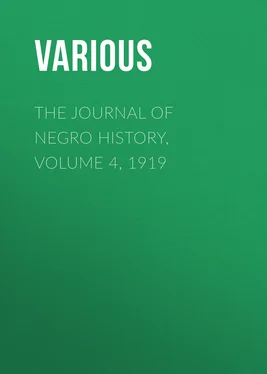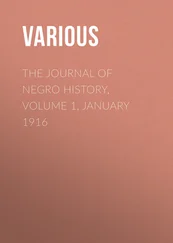Various - The Journal of Negro History, Volume 4, 1919
Здесь есть возможность читать онлайн «Various - The Journal of Negro History, Volume 4, 1919» — ознакомительный отрывок электронной книги совершенно бесплатно, а после прочтения отрывка купить полную версию. В некоторых случаях можно слушать аудио, скачать через торрент в формате fb2 и присутствует краткое содержание. Жанр: foreign_antique, periodic, История, foreign_edu, на английском языке. Описание произведения, (предисловие) а так же отзывы посетителей доступны на портале библиотеки ЛибКат.
- Название:The Journal of Negro History, Volume 4, 1919
- Автор:
- Жанр:
- Год:неизвестен
- ISBN:нет данных
- Рейтинг книги:5 / 5. Голосов: 1
-
Избранное:Добавить в избранное
- Отзывы:
-
Ваша оценка:
- 100
- 1
- 2
- 3
- 4
- 5
The Journal of Negro History, Volume 4, 1919: краткое содержание, описание и аннотация
Предлагаем к чтению аннотацию, описание, краткое содержание или предисловие (зависит от того, что написал сам автор книги «The Journal of Negro History, Volume 4, 1919»). Если вы не нашли необходимую информацию о книге — напишите в комментариях, мы постараемся отыскать её.
The Journal of Negro History, Volume 4, 1919 — читать онлайн ознакомительный отрывок
Ниже представлен текст книги, разбитый по страницам. Система сохранения места последней прочитанной страницы, позволяет с удобством читать онлайн бесплатно книгу «The Journal of Negro History, Volume 4, 1919», без необходимости каждый раз заново искать на чём Вы остановились. Поставьте закладку, и сможете в любой момент перейти на страницу, на которой закончили чтение.
Интервал:
Закладка:
Rev. Dr. Willis was chosen as the first president, an office which he filled during the whole of the period of the struggle. Rev. William McClure, a Methodist clergyman of the New Connection branch, was named as secretary, with Andrew Hamilton as treasurer and Captain Charles Stuart, corresponding secretary. A large committee was also named including, among others, George Brown, editor of The Globe , and Oliver Mowat, later a premier of the province of Ontario.
The aims of the society, as set forth in the resolution of organization, called for both educational and relief work. No time was lost in beginning each of these. Within a month after the founding of the society it was holding public meetings, both in Toronto and elsewhere throughout the province. The speakers included George Thompson, the noted English abolitionist; Fred Douglass, the Negro orator, and Rev. S. J. May, of Syracuse. Some hostility developed, The Patriot charging George Thompson with being an abolitionist for sordid motives, while The Leader called him a "hireling." Thompson, defending himself, declared that if he had sold his talents, as charged, he would not be found fighting the slaves' battle but would be sitting by the side of bloated prostitution in Washington." There were even some clerical critics of the society and its work. The Church , a denominational publication, took the ground that Canada was not bound in any way to denounce "compulsory labor." It was quite sufficient to welcome the slave when he came to Canada. To this The Globe replied that it was "truly melancholy to find men in the nineteenth century teaching doctrines which are only fit for the darkest ages." 47 47 The Globe , April 1, 1851.
All through these earlier years of the society's history the public meetings were continued, much use being made of men like Rev. S. R. Ward and Rev. J. W. Loguen, who had known at first hand what slavery meant to their race. Rev. S. R. Ward was appointed an agent of the society in 1851 and traveled the province over, giving the facts with regard to slavery to awaken Canadian sentiment against it and asking aid and kindness for the fugitives then coming to the country in large numbers. Mr. Ward was instrumental in forming branches and auxiliaries of the society at a number of places and has left on record his own impressions of the efforts that were put forth on behalf of the refugees. 48 48 Ward, Autobiography of a Fugitive Slave .
The Globe , under Brown as editor, was a stout ally. Brown's personal interest in the fugitives was marked. His private generosity to the needy has been recorded by one of his biographers but greater service was rendered through the columns of his paper. He was outspoken in denunciation of anything that savored of an alliance with slavery. Canada, he believed, should stand four square against the whole system of human bondage. "We, too, are Americans," he declared on one occasion. "On us, as well as on them, lies the duty of preserving the honor of the continent. On us, as on them, rests the noble trust of shielding free institutions." 49 49 Lewis, George Brown , p. 114.
Relief work in Toronto was looked after by a Ladies' Auxiliary, this being the general practice wherever branches were organized. The wives of the officers of the general or parent society figured largely in the work at Toronto. During the first year of the work in that city more than $900 was raised by the Ladies' Auxiliary. The report for 1853-5 says: "During the past inclement winter much suffering was alleviated and many cases of extreme hardship prevented. Throughout the year the committee continued to observe the practice of appointing weekly visitors to examine into the truth of every statement made by applicants for aid. In this way between 200 and 300 cases have been attended to, each receiving more or less according to their circumstances." 50 50 Drew, North Side View of Slavery , p. 328.
A night school opened in Toronto gave to the younger men and women an opportunity to get a little education.
The Canadian Society, at an early date in its history, entered into working relations with the anti-slavery societies of Great Britain and the United States. At the first anniversary meeting, held in March, 1852, a letter was presented from Lewis Tappan, secretary of the American and Foreign Anti-Slavery Society, enclosing a resolution of the executive of the American society to the effect that the committee had heard of the formation of the Anti-Slavery Society of Canada at Toronto with much satisfaction, and that they would be pleased to maintain correspondence with this society and unite their efforts for the promotion of the great cause of human freedom on this continent and throughout the world. At the same meeting there were read messages of greeting from S. H. Gay, secretary of the American Anti-Slavery Society, and from John Scoble, secretary of the British and Foreign Anti-Slavery Society. 51 51 Anti-Slavery Society of Canada, First Annual Report, p. 10.
At this first anniversary meeting the society was able to report a change in public sentiment toward its aims. At the start there had been coldness and some prejudice but this had largely disappeared and some who had formerly been hostile were now supporters.
The colonization question was before the society in its early period. In August, 1851, Toronto was visited by Rev. S. Oughten, a Jamaican, and later by William Wemyss Anderson, also of Jamaica. The question was also brought to the attention of the government of the province and the Governor-General asked the executive of the society to tender its opinion of the plan. Their decision was altogether unfavorable to colonization whether in Trinidad or Jamaica. With regard to Trinidad their opinion was that slavery in a modified form still existed there. Jamaica, they thought, had nothing to attract the refugee more than Canada, and the society was placed on record as approving the findings of the Great North American convention of colored people, which had met in Toronto the preceding September, to the effect that western Canada was the most desirable place of resort for colored people on the American continent, and that colored people in the United States should emigrate to Canada rather than to the West Indies or Africa, since in Canada they would be better able to assist their brethren flying from slavery. With regard to the American Colonization Society the finding of the Canadian Anti-Slavery Society was that its professions of promoting the abolition of slavery were "altogether delusive." It had originated with slaveholders and was protected by them to rid the country of free Negroes. "A colonization and a bitter, pro-slavery man are almost convertible terms," it was stated. 52 52 First Annual Report, pp. 12-13.
The attitude taken by the church bodies in Canada towards this new movement is of interest. In general there was not much active support. George Brown brought forward a resolution at the 1852 meeting, deploring the indifference of some church bodies. Dr. Willis had been instrumental in getting the Presbyterians in line, a strong stand having been taken by the synod which declared by resolution that slavery was "inhuman, unjust and dishonoring to the common creator as it is replete with wrong to the subjects of such oppression." A second resolution called upon churches everywhere to testify against legislation which violated the commands of God and declared that the synod must condemn any alliance between religion and oppression, no matter how the latter might be bolstered up by the use of Scripture.
At the 1857 meeting the attitude of the churches was again to the front. Dr. Willis thought it was time that every church synod and conference in Canada should give up one day of its sessions to prayer and humiliation over the presence of human slavery so nearby. It was the duty of all the churches to remonstrate on this question. Rev. Dr. Dick, who followed, declared that the church was "the bulwark of the system." There were churches in Canada which fraternized with those in the United States that patronized slavery. He was equally outspoken on the attitude of the Sons of Temperance in deciding, against his protest, to shut out Negroes from its membership. There were several protests at this 1857 meeting against some slight evidences of race prejudice. Rev. Mr. Barrass said that, as the Negroes in Toronto set an example to the whites in morality, there was the less reason for any prejudice. Thomas Henning, the secretary of the society, probably put the matter right when he pointed out that talk of prejudice must not be understood as general. Negroes were not excluded from the schools, and the laws were administered to white and black alike. He drew attention to the dismissal of a magistrate who had been suspected of conniving at the return of a fugitive, as also to the case of a member of Parliament who had sought to have Negro immigration stopped and had been simply laughed at.
Читать дальшеИнтервал:
Закладка:
Похожие книги на «The Journal of Negro History, Volume 4, 1919»
Представляем Вашему вниманию похожие книги на «The Journal of Negro History, Volume 4, 1919» списком для выбора. Мы отобрали схожую по названию и смыслу литературу в надежде предоставить читателям больше вариантов отыскать новые, интересные, ещё непрочитанные произведения.
Обсуждение, отзывы о книге «The Journal of Negro History, Volume 4, 1919» и просто собственные мнения читателей. Оставьте ваши комментарии, напишите, что Вы думаете о произведении, его смысле или главных героях. Укажите что конкретно понравилось, а что нет, и почему Вы так считаете.












